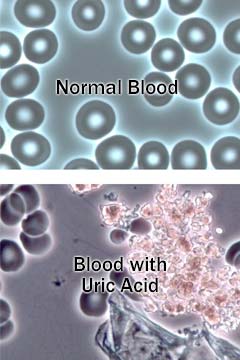Uric acid is a waste product of the body. It results from the breaking down of purines. Purines are a part of all human tissue and are found in many types of food. For most people, uric acid is dissolved in the blood and passed through the kidneys and into the urine, where it is eliminated. But for those with gout, a build up of uric acid in the blood leads to inflammation and gout attacks.

An increase in the production of uric acid or the kidneys not eliminating enough of it from the body can cause the level of uric acid to build up in the blood, a condition known as hyperuricemia. Hyperuricemia is not a disease, and on its own it is nothing to worry about. But, if the excess uric acid forms crystals as a result of hyperuricemia, gout can develop. The uric acid crystals accumulate in the joints, causing inflammation.